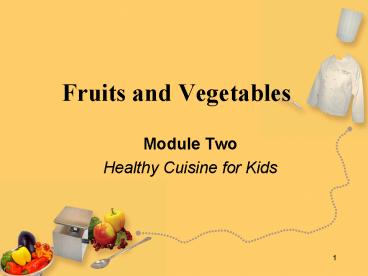Fruits and Vegetables - PowerPoint PPT Presentation
1 / 17
Title:
Fruits and Vegetables
Description:
... of fruits and vegetables, whole grains, and nonfat or low-fat milk and milk products. ... Standardized recipes and procedures. Quality food ingredients ... – PowerPoint PPT presentation
Number of Views:307
Avg rating:3.0/5.0
Title: Fruits and Vegetables
1
Fruits and Vegetables
- Module Two
- Healthy Cuisine for Kids
2
ObjectivesFruits and Vegetables
- 1. Apply the DGA messages to the role of fruits
and vegetables in a healthy diet. - State the nutrient requirements related to fruits
and vegetables prescribed in child nutrition meal
patterns and program standards. - Describe the contribution of fruits and
vegetables to the appeal and acceptabiity of the
menu.
3
ObjectivesFruits and Vegetables, continued
- Apply the correct methods for selecting and
handling fruits and vegetables to ensure high
quality and safe products. - Describe the
- culinary techniques,
- basic skills, and
- cooking methods needed to produce nutritious and
appealing products consistent with the nutrition
principles of the DGA.
4
ObjectivesFruits and Vegetables, continued
- 6. Identify ways to use speed scratch products to
reduce labor without sacrificing product quality. - 7. Describe various methods of enhancing the
flavor of fruits and vegetables.
5
Nutritional Powerhouses Fruits and Vegetables
- Provide color, texture, flavor, and aroma
- Provide valuable nutrients
- Vitamins A, C, E, and the B-Complex
- Complex carbohydrates including fiber, and water
- Contain
- PhytonutrientsFound in plant foods
- Provides many health benefits
- AntioxidantsFound in vitamins A, C, and E
- Protects cells from damage and promotes health
6
Applying the DGA to Fruits and Vegetables
- Consume a variety of foods within and among the
basic food groups while staying within energy
needs. - Control calorie intake to manage body weight.
7
Applying the DGA to Fruits and Vegetables,
continued
- Increase daily intake of fruits and vegetables,
whole grains, and nonfat or low-fat milk and milk
products. - Choose carbohydrates wisely for good health.
- Choose and prepare foods with little salt.
8
Selection and Handling
- Fruits and vegetables may be purchased fresh,
frozen, dried, or canned. - Proper receiving and dry or refrigerated/freezer
storage are essential to preserve quality. - Proper handling procedures are essential to
preserve quality of fresh produce.
9
Quality Standards
- Quality Products require
- Standardized recipes and procedures
- Quality food ingredients
- Correct culinary techniques
- Quality standards are based on appearance,
texture, flavor, and service temperatures. - Quality Score Cards are used to judge the
finished product before it is placed on the
serving line.
10
Characteristics of Quality Fruit and Vegetable
Products
- Appearance
- How does it look?
- Texture or Consistency
- How does it feel in your mouth?
- Flavor and Seasoning
- How does it taste?
- Temperature when Served
- Is the temperature right?
11
Factors Affecting Fruit and Vegetable Quality
- Temperature
- Product Rotation
- Storage and Use Conditions
- Proper Handling During Preparation
12
Child Nutrition Professionals Should
- Have essential basic knowledge and skills.
- Use quality standards to judge products.
- Know how to do their jobs correctly.
- Have a clear picture of the CNP purpose.
- Understand that customer service includes the
food served and the way it is served.
13
Speed Scratch Foods
- Foods that are fully or partially prepared in
advance by the CNP or by the processor to - save on-site preparation time,
- reduce on-site labor costs,
- take advantage of culinary skills, and
- conserve energy.
- These foods may be called value-added, ready
prepared, or convenience.
14
Rules for Speed Scratch
- 1. Follow package instructions.
- 2. Use the recommended
- Equipment,
- Temperature,
- Time, and
- Holding Procedures.
- 3. Remember
Overcooking Wrong Temp Improper Holding
A Poor Quality Product and Unhappy Customers
15
Preserving the Quality of Fruits and Vegetables
- Proper Handling and Storage
- Temperature
- Product Rotation
- Proper Preparation
- Proper Cooking
- Proper Safety Procedures
16
Batch Cooking
- Sometimes called cooking to the line or just
in time. - Minimizes unnecessary loss of flavor, texture,
color, and nutritive value. - Means cooking in small quantities as near the
time of service as possiblejust enough for a
single serving period, or a group of students. - Helps to control costs by reducing waste and
leftovers.
17
Enhancing Vegetable Flavors Bring out the best
- Add seasonings such as herbs and spices.
- Add other flavorful ingredients including other
vegetables, such as onion or green pepper. - Choose a cooking technique, such as browning or
roasting. - Cook just in time for service.































